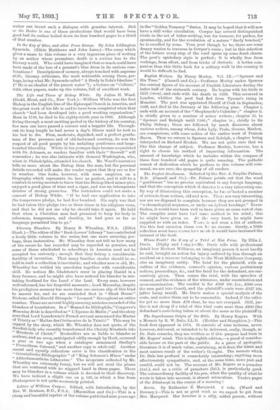Literary Blunders. By Henry B. Wheatley, F.S.A. (Elliot Stock.)—The editor
of the" Book-Lovers' Library "has contributed a lively little volume to the series, but one more amusing, per- haps, than instructive. Mr, Wheatley does not tell us how many of the errors he has recorded may be regarded as genuine, and some of those attributed to schoolboys in America need not be accepted too seriously ; enough that they betray a considerable fertility of invention. That many familiar stories should be re- -told in such a collection is inevitable ; and whether new or old, Mr, Wheatley has welded his anecdotes together with considerable skill. He notices Mr. Gladstone's error in placing Daniel in a fiery furnace, and he might also have noticed his blunder in mis- taking Scotland for the Land o' the Leal. Every man, however well informed, has his forgetful moments ; Lord Macaulay, despite his prodigious memory has more than one serious slip of this kind to answer for, and we are reminded that in "Bleak House" Dickens called Harold Skimpole "Leonard" throughout an entire number. There are several highly amusing mistakes recorded of the blunders of translators. In " Manuel du Bibliophile," Congreve's Mourning Bride is described as" L'Epouse de Matin ;" and the story goes that Lord Lansdowne's French servant announced the Master -of Trinity as "Maitre des C4p3monies de la Trinite." This may be capped by the story, which Mr. Wheatley does not quote, of the Swedish lady who recently transformed the Christy Minstrels into -" Minetrele of Christ." Booksellers are as liable to blunder as authors, and an error, anticipated oddly enough by Hook, occurred a year or two ago when a catalogue announced Shelley's -" Prometheus Unbound," and another copy in whole calf. Another recent and equally ridiculous error is the classification in the "Orientalische Bibliographic" of "King Solomon's Mines "under ." Alttestamentliche Litteratur." The misprints collected by Mr. Wheatley are extremely funny, but we will not steal the plums that are scattered with no niggard hand in these pages. There may be blunders in a volume which is devoted to their discovery. We have noticed a slight one on p 126, in which a line from Shakespeare is not quite accurately printed.


































 Previous page
Previous page